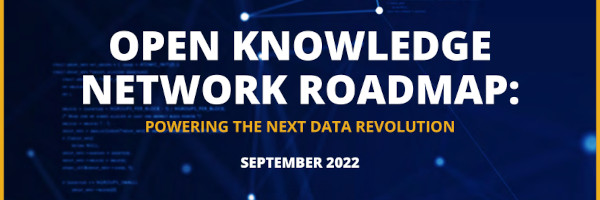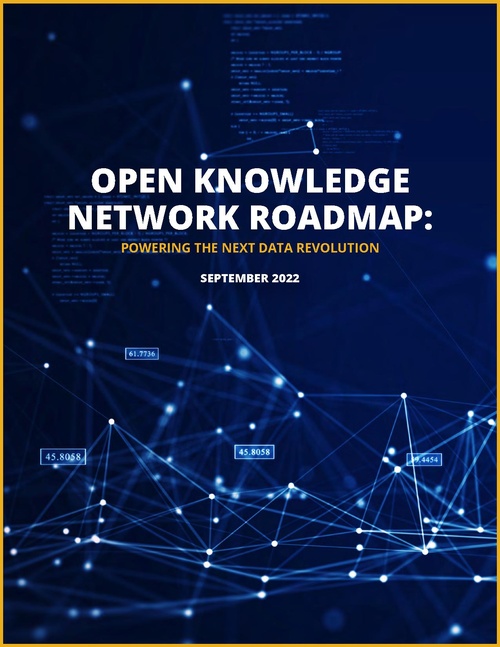Open Knowledge Network Roadmap
| Report | |
|---|---|
| Image | 
|
| Published | 2022-09-30 |
| Point(s) of Contact | Tess DeBlanc-Knowles Chaitan Baru Jemin George Lara Campbell Wo Chang Martin Halbert |
| Organization(s) | National Science Foundation |
| Where | Alexandria VA |

| |
Open access to shared information is essential for the development and evolution of artificial intelligence (AI) and AI-powered solutions needed to address the complex challenges facing the nation and the world. The Open Knowledge Network (OKN), an interconnected network of knowledge graphs, would provide an essential public-data infrastructure for enabling an AI-driven future. It would facilitate the integration of diverse data needed to develop solutions to drive continued strong economic growth, expand opportunities, and address complex problems from climate change to social equity. The OKN
Roadmap describes the key characteristics of the OKN and essential considerations in taking the effort forward in an effective and sustainable manner.
- Data, information, and knowledge
Harnessing the vast amounts of data generated in every sphere of life and transforming them into useful, actionable information and knowledge is crucial to the efficient functioning of a modern society. Data and information should be easy to find, access, and reuse. Knowledge structures that enable integration of vast amounts of diverse data in service of a very broad range of uses across society represent the national infrastructure for a prosperous future. Knowledge graphs are an important type of knowledge structure to enable such integration. They consist of nodes and edges — where nodes represent real-world entities (e.g., a city, a neighborhood, a court case, a gene, a chemical compound), and edges represent different types of relationships among nodes. The Open Knowledge Network is envisioned as an open, interconnected network of knowledge graphs that serves as public, accessible infrastructure. This infrastructure will enable development of a variety of solutions for a broad spectrum of societal use cases using open, public data, as well as data requiring controlled access. In February 2022, the National Science Foundation (NSF) in partnership with the White House Office of Science and Technology Policy, launched an OKN Innovation Sprint. The Sprint harnessed the collective insights of roughly 150 experts from government, industry, academia, and nonprofit organizations to help build a roadmap for a Prototype OKN (Proto-OKN), from specific use cases and end-user perspectives. The main findings from this Sprint are summarized in this report. The context for this activity is provided by the original vision for an OKN described in the NSF Harnessing the Data Revolution Big Idea and by projects in Track A: Open Knowledge Network of the NSF Convergence Accelerator. Discussions during the Innovation Sprint helped clarify that the creation of an OKN is fundamentally a sociotechnical effort that must consider human, social and organizational factors, as well as a technical effort. Deep engagement is necessary among domain knowledge experts and a host of other stakeholders including data owners, decision-makers, various end-user communities, tool builders, and knowledge representation experts. User-centered design approaches, stakeholder involvement and alignment, and customer engagement are essential to ensuring an impactful and sustainable outcome. The Innovation Sprint focused on the needs and requirements of end-users and various stakeholders. Sprint participants formed 17 use-case groups. Thirteen groups focused on “verticals” (i.e., specific application areas), and four focused on cross-cutting, “horizontal” themes. Section 6 of the report introduces these use cases. Appendix A describes their activities and outcomes in detail.